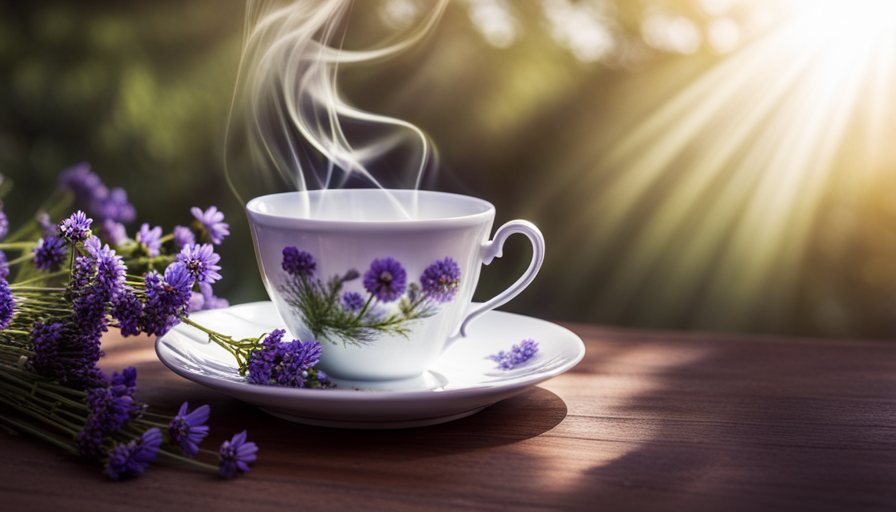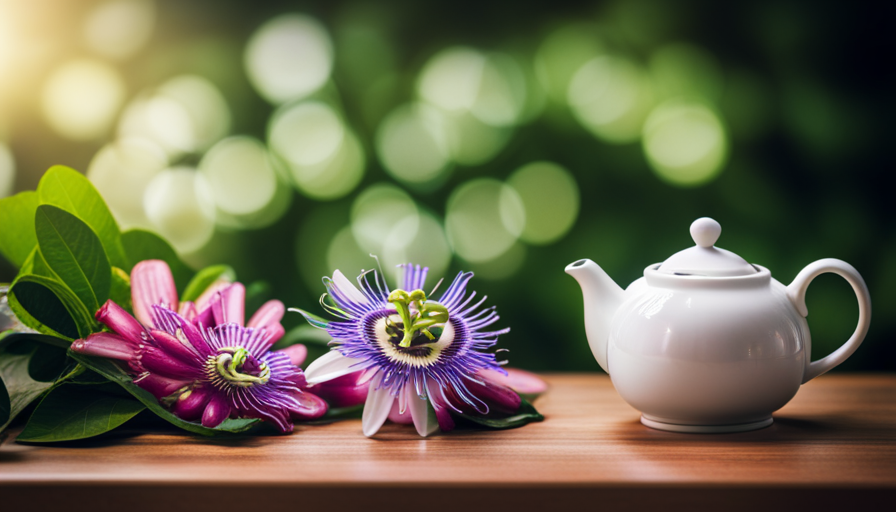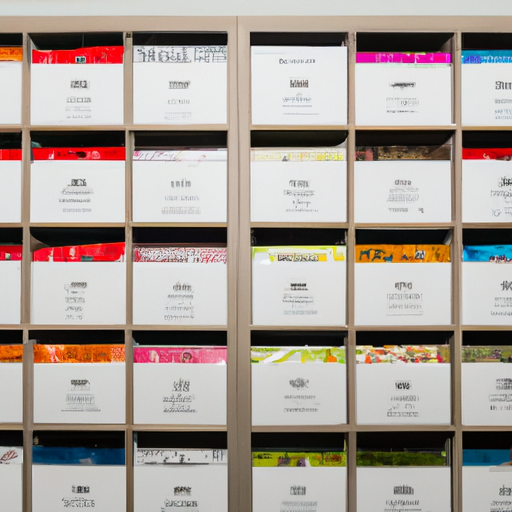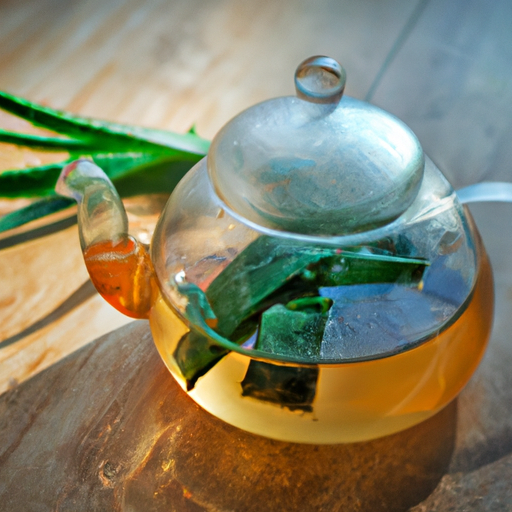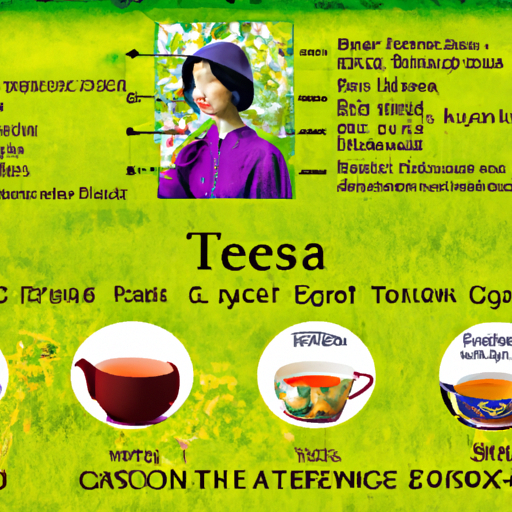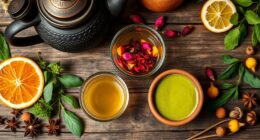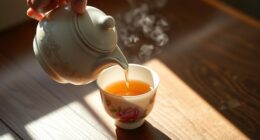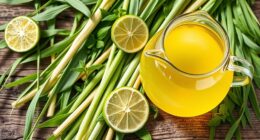Herbal tea is truly a heavenly drink! Its flavors blend harmoniously on the taste buds, creating a symphony of nature’s best elements.
From the moment the warm liquid touches my lips, a burst of aromatic bliss envelops my senses. The taste, oh the taste! It is a tantalizing journey through meadows of chamomile, forests of mint, and gardens of lavender.
Each sip is a revelation, a treasure trove of flavors that transport me to distant lands. The delicate sweetness of hibiscus, the earthy notes of rooibos, and the refreshing tang of lemongrass create a harmonious melody that lingers on my tongue.
With every sip, I am whisked away to a tranquil oasis, a moment of respite from the hustle and bustle of everyday life.
Herbal tea is not just a beverage, it is a sensory experience. It is a symphony of flavors, a dance of aromas, and a celebration of nature’s bounty.
So, come, join me on this enchanting journey as we explore the delightful world of herbal tea and uncover its secrets, one sip at a time.
Key Takeaways
- Herbal tea has diverse flavors and aromas, ranging from refreshing and cooling (such as peppermint) to warm and spicy (like ginger).
- Brewing techniques, including heat levels and steeping times, play a crucial role in bringing out the flavors and aromas of herbal tea.
- Adding lemon or honey can enhance the taste and aroma of herbal tea.
- Herbal tea can be paired with food to enhance the culinary experience, such as chamomile tea with honey cake or peppermint tea with chocolate brownies.
Introduction to Herbal Tea
When you indulge in herbal tea, you’ll experience a delightful array of flavors that will captivate your palate. Herbal tea, also known as tisane, is a beverage made from the infusion or decoction of herbs, spices, or other plant materials. It has been consumed for centuries and is renowned for its various health benefits. Understanding the origins and history of herbal tea is essential to appreciate its cultural significance.
From ancient civilizations to modern times, herbal tea has been used for its medicinal properties and soothing effects.
One of the most fascinating aspects of herbal tea is the wide range of flavors and aromas it offers. Each herb or plant used in the infusion brings its unique taste and scent, creating a harmonious blend.
From the refreshing minty notes of peppermint tea to the floral and delicate taste of chamomile tea, there is a flavor to suit every preference. Some herbal teas have a fruity essence, like hibiscus tea with its tangy and vibrant flavor, while others have a more earthy and robust profile, such as rooibos tea.
Exploring the different types of herbal tea allows you to discover new and exciting flavors that can complement your daily routine or provide a moment of relaxation. So, let’s delve into the world of herbal tea and uncover the wonders it has to offer.
Exploring the Different Types of Herbal Tea
Among the various types of herbal tea, the flavors are so diverse and delightful that it feels like taking a sip can transport you to a whole new world. Each type of herbal tea has its own distinct flavor profile, offering a unique taste experience.
From soothing and floral chamomile to invigorating and citrusy lemongrass, there’s a herbal tea to suit every palate.
One popular herbal tea flavor is peppermint, which has a refreshing and cooling taste that can awaken your senses. It’s often enjoyed for its ability to aid digestion and relieve headaches.
Another common flavor is ginger, which has a warm and spicy taste that adds a kick to any tea blend. Ginger tea is known for its soothing properties and is often used to alleviate nausea and promote digestion.
In addition to these classic flavors, there are also herbal teas that combine different ingredients to create more complex tastes. For example, a blend of hibiscus and rosehip creates a tart and fruity tea, while a mix of lavender and chamomile offers a calming and floral flavor.
Drinking herbal tea not only provides a delightful taste experience but also offers numerous health benefits. It can help with relaxation, digestion, immune support, and even sleep quality. Transitioning into the next section about the benefits of drinking herbal tea, it’s clear that exploring the world of herbal tea can be both a flavorful and beneficial journey.
The Benefits of Drinking Herbal Tea
Indulging in a cup of herbal tea offers a multitude of health benefits that can enhance both your physical and mental well-being. Herbal teas are not only delicious, but they’re also packed with nutrients and antioxidants that promote overall health.
One of the key health benefits of herbal tea is its ability to boost the immune system. The antioxidants found in herbal teas help strengthen the immune system, making it more effective at fighting off infections and illnesses.
Additionally, herbal teas have been shown to have relaxation effects, making them the perfect beverage to enjoy after a long day. The calming properties of herbal tea can help reduce stress and anxiety, promoting a sense of calm and relaxation. This can also help improve sleep quality, making it easier to fall asleep and stay asleep throughout the night.
So, whether you’re looking to improve your immune system or simply unwind after a busy day, herbal tea is a great choice.
As we move on to the next section about brewing and serving herbal tea, you’ll learn how to make the perfect cup of herbal tea to maximize its health benefits.
Brewing and Serving Herbal Tea
To truly savor the full experience of brewing and serving herbal tea, you’ll want to embrace the art of steeping and pouring with a touch of finesse. Brewing techniques play a crucial role in bringing out the flavors and aromas of herbal tea.
Start by heating water to the appropriate temperature, as different herbs require different heat levels. Once the water’s ready, place the herbal tea leaves or tea bags in a teapot or cup and pour the hot water over them. Let it steep for the recommended time, usually around 5-7 minutes, to allow the flavors to infuse fully.
When it comes to serving herbal tea, there are a few suggestions to consider. Firstly, choose the right cup or mug that complements the tea’s aroma and color. Clear glass cups can showcase the vibrant hues of herbal teas, while ceramic mugs can retain heat for a longer time. Additionally, adding a slice of lemon or a drizzle of honey can enhance the taste and aroma of herbal tea.
As you become more familiar with the brewing and serving techniques, you’ll discover the perfect pairing of herbal tea with food. The refreshing taste of mint herbal tea can complement light salads or fresh fruit, while chamomile tea pairs well with desserts like lemon cake or shortbread cookies.
So, let’s explore the delightful world of pairing herbal tea with food.
Pairing Herbal Tea with Food
Enhance your culinary experience by discovering the perfect pairing of herbal tea with food. When it comes to pairing herbal tea with desserts, the possibilities are endless. The unique flavors of herbal teas can complement and enhance the taste of a wide range of sweet treats.
Here are five delightful combinations to try:
-
Chamomile tea with honey cake: The sweet and floral notes of chamomile beautifully complement the rich and moist honey cake, creating a harmonious blend of flavors.
-
Peppermint tea with chocolate brownies: The cool and refreshing taste of peppermint tea provides a refreshing contrast to the rich and decadent chocolate brownies, making each bite even more indulgent.
-
Lemon verbena tea with lemon tart: The bright and citrusy flavors of lemon verbena tea perfectly match the tangy and refreshing taste of a lemon tart, creating a zesty and refreshing dessert experience.
-
Lavender tea with lavender macarons: The delicate floral aroma of lavender tea pairs wonderfully with the light and airy texture of lavender macarons, resulting in a truly exquisite and fragrant dessert.
-
Hibiscus tea with fruit sorbet: The tart and vibrant flavors of hibiscus tea complement the sweet and refreshing taste of fruit sorbet, creating a refreshing and palate-cleansing combination.
By exploring these unique herbal tea flavors and their perfect food pairings, you can elevate your dessert experience to new heights.
Now, let’s transition into the subsequent section about exploring herbal tea blends.
Exploring Herbal Tea Blends
Delve into the world of herbal tea blends and discover the fascinating variety of flavors that can evoke a sense of nostalgia, with 80% of tea enthusiasts stating that trying new blends transports them to fond memories and comforting moments. Herbal tea flavors are as diverse as the plants they are derived from, offering a wide range of tastes that can satisfy any palate. From floral and fruity to earthy and spicy, there is a herbal tea blend for every mood and occasion.
To give you a glimpse into the enchanting world of herbal tea blends, here is a table showcasing some popular flavors and their unique characteristics:
| Flavor | Description |
|---|---|
| Chamomile | Delicate and soothing, with a hint of apple and honey, perfect for winding down after a long day. |
| Peppermint | Refreshing and cooling, with a minty aroma that awakens the senses, ideal for relieving digestive discomfort. |
| Hibiscus | Tangy and vibrant, with a deep red color and a fruity taste reminiscent of cranberries, a delightful summer treat. |
| Ginger | Spicy and warming, with a zesty kick that invigorates the body and helps with digestion. |
| Lavender | Floral and calming, with a subtle sweetness that promotes relaxation and eases stress. |
| Cinnamon | Warm and comforting, with a rich aroma and a hint of sweetness, perfect for chilly winter evenings. |
Exploring herbal tea blends not only opens up a world of flavors, but it also allows you to experiment with herbal tea recipes. From creating your own unique blends to incorporating herbal teas into baked goods and cocktails, the possibilities are endless. So, let’s now transition into the next section and discover how herbal tea can contribute to our health and wellness journey.
Herbal Tea for Health and Wellness
Discover the incredible benefits that herbal tea can bring to your health and wellness journey, as it nourishes your body and soothes your soul.
Herbal tea is not only a delicious and refreshing beverage, but it also offers a wide variety of flavors that cater to different tastes and preferences. From soothing chamomile to invigorating peppermint, there’s a herbal tea flavor for everyone.
In addition to its delightful taste, herbal tea is known for its medicinal properties that can promote overall well-being. Many herbal teas are packed with antioxidants, vitamins, and minerals that can boost your immune system, aid digestion, and reduce inflammation. Whether you’re looking to calm your nerves with a cup of lavender tea or improve your sleep with a blend of chamomile and valerian root, herbal tea recipes offer a natural and holistic approach to health.
By incorporating herbal tea into your daily routine, you can create a ritual that not only nourishes your body but also provides a moment of relaxation and self-care. The act of sipping a warm cup of herbal tea can be a soothing and meditative experience, allowing you to unwind and find solace in the present moment.
So, let’s explore the ritual and experience of drinking herbal tea, and delve into the various ways it can enhance your overall well-being.
The Ritual and Experience of Drinking Herbal Tea
Immersing yourself in the rich and comforting aroma of a steaming cup of herbal tea can transport you to a place of tranquility and relaxation. The sensory experience of drinking herbal tea goes beyond just taste. As you take your first sip, the warm liquid envelops your taste buds, releasing a delicate blend of flavors that can range from floral and fruity to earthy and spicy.
Each herbal blend has its own unique combination of ingredients, carefully selected to create a harmonious balance of taste and aroma.
Herbal tea has a cultural significance that spans across different countries and traditions. In many cultures, it’s not just a beverage, but a ritual that brings people together. Whether it’s the Japanese tea ceremony or the Moroccan tradition of serving mint tea, the act of preparing and sharing herbal tea is steeped in history and symbolism.
As you explore herbal tea around the world, you’ll discover an array of flavors and brewing methods that reflect the diversity of cultures. From the bold and robust flavors of Indian chai to the delicate and soothing properties of chamomile tea, each cup offers a glimpse into the traditions and customs of its origin.
So, let’s embark on a journey to explore the world of herbal tea and discover the wonders it has to offer.
Exploring Herbal Tea Around the World
As you journey through different cultures, you’ll find that herbal tea is a passport to diverse flavors and brewing techniques, opening doors to a world of aromatic wonders. Each region has its own unique way of preparing and enjoying herbal tea, resulting in a wide array of flavors that cater to varying tastes and preferences.
Let’s take a trip around the world and explore some of the herbal tea flavors and cultural traditions that make each cup a delightful experience. In China, for example, jasmine tea is a popular choice, with its delicate floral aroma and soothing taste. In India, chai tea blends a variety of spices like cinnamon, cardamom, and ginger, creating a warm and invigorating beverage. On the other hand, Moroccan mint tea combines fresh mint leaves with gunpowder green tea, resulting in a refreshing and minty infusion.
To give you a better understanding of the herbal tea landscape, here’s a table showcasing a few examples of herbal teas from different countries:
| Country | Herbal Tea | Flavor Profile |
|---|---|---|
| China | Jasmine Tea | Floral and Fragrant |
| India | Chai Tea | Spicy and Aromatic |
| Morocco | Moroccan Mint Tea | Refreshing and Minty |
| Japan | Matcha Green Tea | Earthy and Vegetal |
As we conclude our journey through the diverse world of herbal tea, it’s clear that each culture has its own unique flavors and traditions. From floral and fragrant to spicy and aromatic, there is a herbal tea out there to suit every palate. So go ahead, explore the vast range of herbal teas available and embark on your own flavorful adventure.
Conclusion and Final Thoughts on the World of Herbal Tea
Take a moment to reflect on your journey through the world of herbal tea, appreciating the diverse flavors and cultural traditions that have enriched your taste buds. As you conclude this exploration, it’s time to gather your final thoughts and reflect on the overall experience.
The world of herbal tea has opened up a whole new dimension of flavors for me. From the delicate floral notes of chamomile to the invigorating minty taste of peppermint, each sip has been a unique and refreshing experience. I’ve been amazed by the variety of herbal teas available, each with its own distinct taste profile.
Not only did I discover a range of flavors, but I also gained a deeper appreciation for the cultural traditions associated with herbal tea. From the ancient Chinese practice of drinking green tea for its health benefits to the soothing rituals of Moroccan mint tea, I’ve witnessed how herbal tea is deeply ingrained in different cultures around the world.
My journey through the world of herbal tea has been an eye-opening and delightful experience. The flavors and cultural traditions have broadened my horizons and enriched my taste buds. I now have a newfound appreciation for the wonders of herbal tea and the diverse tapestry it weaves across the globe.
So, as you embark on your own herbal tea adventure, savor each sip and let the flavors transport you to different lands and cultures.
Frequently Asked Questions
Can herbal tea be made with fresh herbs from the garden?
Yes, absolutely! Making herbal tea with fresh herbs from the garden is an incredible experience. The aroma alone will transport you to a blissful oasis. The benefits of using fresh herbs are immense – they’re packed with potent flavors and nutrients that can enhance your overall well-being.
There are countless herbal tea recipes out there, each offering unique health benefits and delicious taste profiles. So go ahead, indulge in the wonders of nature and create your own herbal tea masterpiece!
Are there any potential side effects or risks associated with drinking herbal tea?
There are potential side effects and risks associated with drinking herbal tea, especially if consumed in excess or without proper knowledge. Some herbs may interact with medications or cause allergic reactions. It is important to consult with a healthcare professional before incorporating herbal tea into your routine.
Additionally, some herbs may have specific recommended dosages to ensure safety and effectiveness. It’s always best to do thorough research and seek guidance to maximize the potential benefits and minimize any potential risks.
Can herbal tea be consumed cold or does it need to be served hot?
Herbal tea can absolutely be enjoyed cold, offering a refreshing and rejuvenating experience. There are numerous benefits to drinking herbal tea cold, such as its ability to quench thirst and cool the body.
To prepare herbal tea for cold consumption, you can brew it as usual and then simply let it cool down before refrigerating or adding ice. Alternatively, you can make a cold brew by steeping the tea leaves in cold water overnight.
The result is a delightful and invigorating beverage perfect for hot summer days.
How long does herbal tea typically last before it goes bad?
Herbal tea has an incredibly long shelf life! It can last for years if stored properly. To keep it fresh, store it in an airtight container in a cool, dark place. Avoid exposing it to moisture or sunlight, as they can degrade the tea.
It’s important to check for any signs of spoilage, such as a musty smell or mold growth. By following these storage tips, you can enjoy your herbal tea long after you’ve first bought it!
Can herbal tea be sweetened with honey or other sweeteners?
Yes, herbal tea can definitely be sweetened with honey or other sweeteners. There are several sweetener options available that can enhance the flavor of herbal tea. Honey is a popular choice due to its natural sweetness and the variety of flavors it can add to the tea. Other natural alternatives like stevia or agave syrup can also be used to sweeten herbal tea, providing a delicious and healthy alternative to processed sugars.
Conclusion
In conclusion, herbal tea is a fascinating and versatile beverage that offers a wide range of flavors and health benefits. From the earthy notes of chamomile to the refreshing zest of peppermint, herbal teas provide a unique and enjoyable taste experience.
Some may argue that herbal teas lack the robustness of traditional teas, but they make up for it with their soothing and calming properties. So, next time you’re looking for a beverage that not only tastes delicious but also promotes wellness, give herbal tea a try. You won’t be disappointed.

